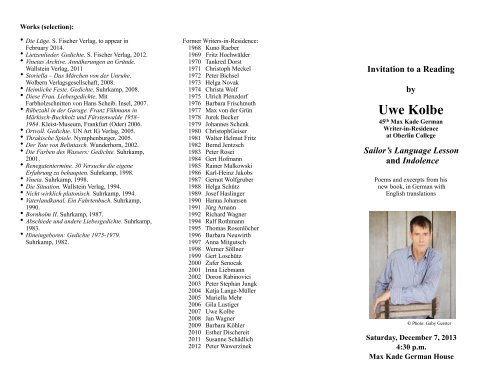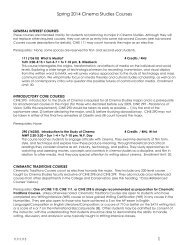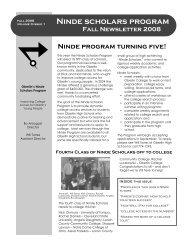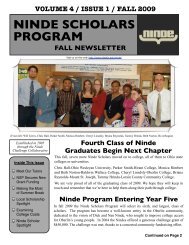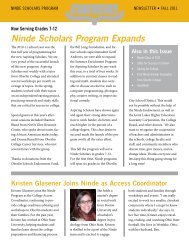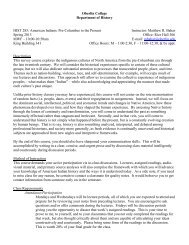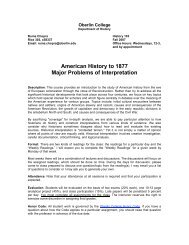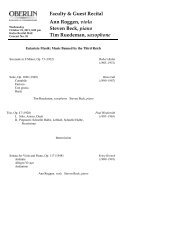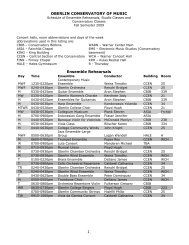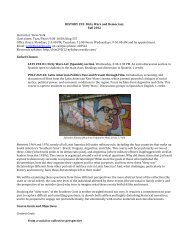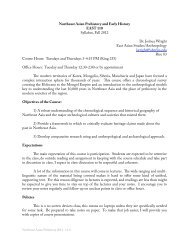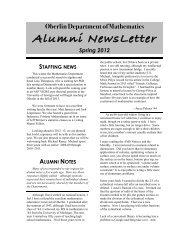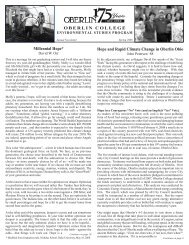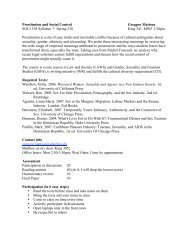Uwe Kolbe-tri-fold - Oberlin College
Uwe Kolbe-tri-fold - Oberlin College
Uwe Kolbe-tri-fold - Oberlin College
Create successful ePaper yourself
Turn your PDF publications into a flip-book with our unique Google optimized e-Paper software.
Works (selection):<br />
• Die Lüge. S. Fischer Verlag, to appear in<br />
February 2014.<br />
• Lietzenlieder. Gedichte. S. Fischer Verlag, 2012.<br />
• Vinetas Archive. Annäherungen an Gründe.<br />
Wallstein Verlag, 2011<br />
• Storiella – Das Märchen von der Unruhe.<br />
Wolbern Verlagsgesellschaft, 2008.<br />
• Heimliche Feste. Gedichte. Suhrkamp, 2008.<br />
• Diese Frau. Liebesgedichte. Mit<br />
Farbholzschnitten von Hans Scheib. Insel, 2007.<br />
• Rübezahl in der Garage. Franz Fühmann in<br />
Märkisch-Buchholz und Fürstenwalde 1958–<br />
1984. Kleist-Museum, Frankfurt (Oder) 2006.<br />
• Ortvoll. Gedichte. UN Art IG Verlag, 2005.<br />
• Thrakische Spiele. Nymphenburger, 2005.<br />
• Der Tote von Belintasch. Wunderhorn, 2002.<br />
• Die Farben des Wassers: Gedichte. Suhrkamp,<br />
2001.<br />
• Renegatentermine. 30 Versuche die eigene<br />
Erfahrung zu behaupten. Suhrkamp, 1998.<br />
• Vineta. Suhrkamp, 1998.<br />
• Die Situation. Wallstein Verlag, 1994.<br />
• Nicht wirklich platonisch. Suhrkamp, 1994.<br />
• Vaterlandkanal. Ein Fahrtenbuch. Suhrkamp,<br />
1990.<br />
• Bornholm II. Suhrkamp, 1987.<br />
• Abschiede und andere Liebesgedichte. Suhrkamp,<br />
1983.<br />
• Hineingeboren: Gedichte 1975-1979.<br />
Suhrkamp, 1982.<br />
Former Writers-in-Residence:<br />
1968 Kuno Raeber<br />
1969 Fritz Hochwälder<br />
1970 Tankred Dorst<br />
1971 Christoph Meckel<br />
1972 Peter Bichsel<br />
1973 Helga Novak<br />
1974 Christa Wolf<br />
1975 Ulrich Plenzdorf<br />
1976 Barbara Frischmuth<br />
1977 Max von der Grün<br />
1978 Jurek Becker<br />
1979 Johannes Schenk<br />
1980 ChristophGeiser<br />
1981 Walter Helmut Fritz<br />
1982 Bernd Jentzsch<br />
1983 Peter Rosei<br />
1984 Gert Hofmann<br />
1985 Rainer Malkowski<br />
1986 Karl-Heinz Jakobs<br />
1987 Gernot Wolfgruber<br />
1988 Helga Schütz<br />
1989 Josef Haslinger<br />
1990 Hanna Johansen<br />
1991 Jürg Amann<br />
1992 Richard Wagner<br />
1994 Ralf Rothmann<br />
1995 Thomas Rosenlöcher<br />
1996 Barbara Neuwirth<br />
1997 Anna Mitgutsch<br />
1998 Werner Söllner<br />
1999 Gert Loschütz<br />
2000 Zafer Senocak<br />
2001 Irina Liebmann<br />
2002 Doron Rabinovici<br />
2003 Peter Stephan Jungk<br />
2004 Katja Lange-Müller<br />
2005 Mariella Mehr<br />
2006 Gila Lustiger<br />
2007 <strong>Uwe</strong> <strong>Kolbe</strong><br />
2008 Jan Wagner<br />
2009 Barbara Köhler<br />
2010 Esther Dischereit<br />
2011 Susanne Schädlich<br />
2012 Peter Wawerzinek<br />
Invitation to a Reading<br />
by<br />
<strong>Uwe</strong> <strong>Kolbe</strong><br />
45 th Max Kade German<br />
Writer-in-Residence<br />
at <strong>Oberlin</strong> <strong>College</strong><br />
Sailor’s Language Lesson<br />
and Indolence<br />
Poems and excerpts from his<br />
new book, in German with<br />
English translations<br />
© Photo: Gaby Gerster<br />
Saturday, December 7, 2013<br />
4:30 p.m.<br />
Max Kade German House
<strong>Uwe</strong> <strong>Kolbe</strong> – poet, essayist,<br />
novelist – was born in the former East<br />
Berlin in 1957, four years before<br />
construction on the famous Berlin Wall<br />
commenced in 1961, which would divide<br />
the city in half for the next 28 years. His<br />
early childhood was spent with his parents<br />
on river barges navigating the inland<br />
waterways on which they worked. Strong<br />
visions of these waters swirling in and<br />
around Berlin resurface time and again in<br />
his poetry, tying it not only to Berlin’s<br />
history as a settlement in the Märkisch<br />
marshes, but also to <strong>Kolbe</strong>’s own history as<br />
a child of this city.<br />
German riverscapes not only<br />
nourished <strong>Kolbe</strong>’s roots, but also perhaps<br />
symbolize an escape route – fluidity was<br />
not readily available in the s<strong>tri</strong>ctly<br />
controlled East German regime, but in<br />
poetry, anything is possible. <strong>Kolbe</strong> began<br />
writing at age 14 and published his poems<br />
at 19, in the venerable literary journal Sinn<br />
und Form in 1976; he managed to publish<br />
his first books of poetry, Hineingeboren<br />
and Abschiede, before being banned from<br />
further publication in the GDR for three<br />
years. Following this interdiction, <strong>Kolbe</strong><br />
stirred up his own groundwater currents by<br />
collaborating with Bernd Wagner and<br />
Lothar Trolle on the underground literary<br />
newspaper Mikado (1983-1987). In 1986<br />
<strong>Kolbe</strong> obtained a visa permitting him to<br />
travel outside the GDR, and after several<br />
years of touring the Netherlands, Aus<strong>tri</strong>a,<br />
Switzerland, and Germany to give lectures,<br />
<strong>Kolbe</strong> spent the fall of 1989 as the Writerin-Residence<br />
at the University of Texas at<br />
Austin - which put him in the strange<br />
position of witnessing the historic fall of<br />
the Berlin Wall from the other side of the<br />
world instead of from his own front door.<br />
<strong>Kolbe</strong> has continued to travel<br />
widely and publish prolifically since then.<br />
He has received fellowships to work in a<br />
wide variety of places, including Italy<br />
(Konrad-Adenauer Stiftung, Villa la<br />
Collina), and Bulgaria (Stiftung<br />
Künstlerhaus Edenkoben, Rheinland-<br />
Pfalz). He has also participated in readings<br />
and festivals in Jerusalem, Beirut, Tel Aviv,<br />
Sarajevo, Nicaragua, Colombia, and New<br />
York City, and he has lectured and held<br />
workshops in London, Buenos Aires,<br />
Sydney, and Seoul. In between his<br />
numerous engagements, <strong>Kolbe</strong> found time<br />
to grow his already substantial collection<br />
of poetic publications, most recently<br />
releasing Lietzenlieder (2012), Heimliche<br />
Feste: Gedichte (2008), and Diese Frau:<br />
Liebesgedichte (2007). He has explored<br />
genres as much as places: in addition to<br />
poems, <strong>Kolbe</strong> has also published essays,<br />
translations, stories, and a detective novel.<br />
Since his first Writer-in-Residence<br />
position in Texas, <strong>Kolbe</strong> has also held<br />
appointments at a number of German,<br />
British, and American universities –<br />
including <strong>Oberlin</strong> <strong>College</strong> in the fall of<br />
2007. In fact, <strong>Kolbe</strong> is <strong>Oberlin</strong>’s only<br />
Writer-in-Residence to be invited back for<br />
a second term. (Readers of <strong>Kolbe</strong>’s latest<br />
book, Lietzenlieder, may recognize<br />
<strong>Oberlin</strong>’s landscape in some of the<br />
American-inspired poems.) He is glad to<br />
be back to work in a community with<br />
which he is already so well acquainted, and<br />
is excited to use the “amazing resources”<br />
of this “wonderful island,” as he calls<br />
<strong>Oberlin</strong>, to push forward with his latest<br />
projects.<br />
<strong>Kolbe</strong>’s personal philosophy<br />
dictates that once an experience has been<br />
translated into an artistic work, it is no<br />
longer purely a receptacle for the artist’s<br />
own sentiment, but rather a conduit for<br />
conversation, an avenue by which to<br />
access and interact with the audience’s<br />
experiences. This emphasis on artistic and<br />
experiential interaction underlies <strong>Kolbe</strong>’s<br />
collaborative work, including the woodcuts<br />
by Hans Scheib that illustrate Diese Frau<br />
and the sonnet cycle in Lietzenlieder,<br />
which was written to accompany an artist’s<br />
exhibition in Berlin. In addition, all of<br />
<strong>Kolbe</strong>’s work is strongly informed by his<br />
impressive grasp of literary history, which<br />
puts his words in conversation not only<br />
with his contemporaries and his audience,<br />
but also with the great artists before him<br />
who shaped literature as we know it.<br />
<strong>Kolbe</strong>’s repertoire for this reading was,<br />
unsurprisingly, chosen with the spirit of<br />
collaborative engagement; each student in<br />
his German seminar selected a poem to be<br />
read, and some furnished their own<br />
translations.<br />
We hope that all who attend the<br />
reading will join the conversation.<br />
by Ida Hoequist and Sophie Richardson


